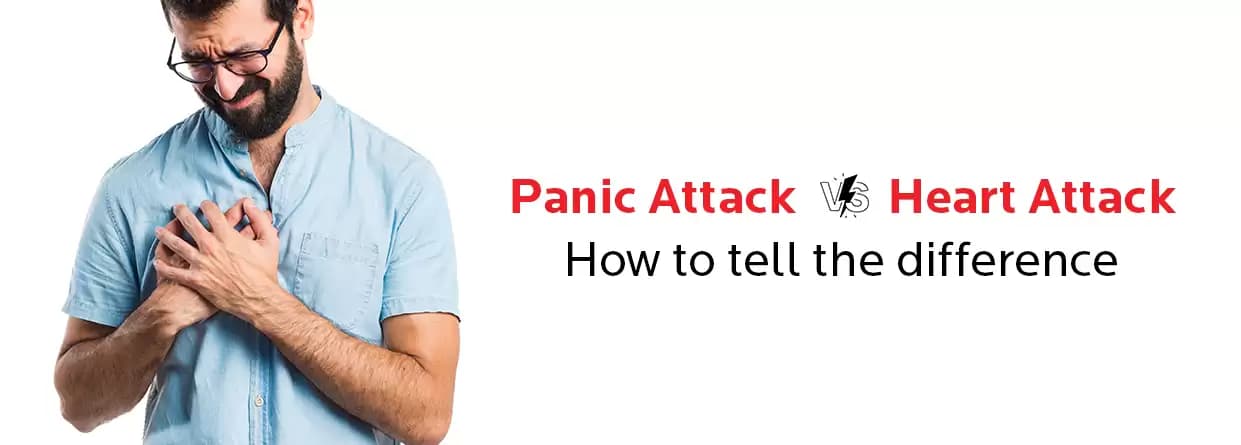
A panic attack is an abrupt surge of profound fear or discomfort reaching its peak within no time. It is majorly a psychological illness and it is not a physical disease. It is a form of anxiety disorder determined by a rapid beginning of intense physical and psychological symptoms.
In our lives at some point, we come across moments of intense physical discomfort or anxiety. When such episodes appear abruptly, it becomes very important to be mindful of the difference between a panic attack and a heart attack. However, both conditions have almost similar symptoms, comprehending the main differences can reduce unnecessary panic and ensure appropriate medical attention when required.
If you have been experiencing any symptoms like rapid heartbeat, chest pain, shortness of breath, sweating, etc., make sure to consult a cardiology specialist, as it is hard to differentiate the symptoms.
You can get in touch with one of the best cardiac hospitals in Kolkata BM Birla Heart Research Centre. You will find the most experienced and talented cardiologists, cardiac surgeons, and other healthcare team members. In this blog, we are going to explore the distinguishing features of panic attacks and heart attacks to help you better understand and respond to every situation.
A panic attack is an abrupt surge of profound fear or discomfort reaching its peak within no time. It is majorly a psychological illness and it is not a physical disease. It is a form of anxiety disorder determined by a rapid beginning of intense physical and psychological symptoms. These attacks can be very distressing and may happen unexpectedly or in response to a particular trigger. Panic attacks are known for their one-time occurrence, however, they can be recurrent and can grow into panic disorder if not treated on time.
Panic attacks are usually accompanied by an amalgamation of grievous symptoms, including:
These symptoms are scary and overwhelming, but they usually go away within minutes or hours. Panic attacks are an outcome of stress, anxiety, or some triggers, and don’t cause any lasting physical damage to the body.
Panic attacks are often triggered by several factors which include stress, trauma history, certain phobias, or panic disorder family history. They can appear unexpectedly without any probable trigger. Panic attacks are linked to an overactive fight-or-flight response, in which the body’s natural reaction to perceived danger becomes exaggerated.
Treating panic attacks often involve a combination of therapies. Cognitive-behavioral therapy (CBT) can help individuals identify and change patterns of negative thinking and behaviors that contribute to panic attacks. Medications such as selective serotonin reuptake inhibitors (SSRIs) or benzodiazepines may be prescribed in severe cases.
, Unlike panic attacks, a heart attack is a clinical emergency that occurs because of restricted blood flow to the heart muscle. It is caused by a blockage in one or more of the coronary arteries supplying blood to the heart. Heart attacks usually occur as an outcome of coronary artery disease, a condition where fatty deposits known as plaques build up in the coronary arteries which cause narrowed and reduced blood flow. At times, a plaque can rupture causing the formation of a blood clot blocking the artery.
The heart attack symptoms are noticeable and one must not avoid them in any case. Here are some of the common symptoms of a heart attack:
Heart attacks are often caused by a blockage in the coronary artery supplying oxygen and nutrients to the heart muscle. The blockage is a result of a cholesterol plaque buildup often causing a complete or partial artery occlusion. There are certain risk factors that increase the chance of heart attack and it includes smoking, high blood pressure, high cholesterol, obesity, diabetes, and a sedentary lifestyle.
Prompt clinical attention is very important for heart attack patients. Emergency medical personnel immediately start administering the patient by giving aspirin and performing procedures like angioplasty or stenting to restore blood flow to the heart. Certain medications are also recommended which include blood thinners, beta-blockers, and statins. These medications are commonly given to manage the condition and lessen the probability of future heart attacks.
It's important to understand that if you or someone else experiences symptoms attributed to a heart attack, then it's a medical emergency, and you must promptly seek medical attention by calling emergency services. On the other hand, if you detect a panic attack, ensure finding a calm and safe environment, practicing deep breathing, and engaging in relaxation techniques are helpful in managing the symptoms. If panic attacks occur or significantly impact regular life, it's recommended to get in touch with a leading cardiologist in Kolkata at the BM Birla Heart Research Centre for evaluation and right guidance.
If suddenly panic attacks occur make sure to breathe in and breathe out deeply, and make sure to focus on your breathing patterns.
There are certain tips that can help in curing panic attacks fast such as staying active, indulging in hobbies, meditation, practicing yoga, eating a balanced diet, quit smoking and alcohol.
To avoid a heart attack, it is recommended to:
It is recommended to call a medical emergency immediately, give aspirin to the patient, and give CPR if the person is unconscious.
Written and Verified by:

Dr. Shuvo Dutta is a Senior Consultant in Cardiology Dep. at BM Birla Heart Hospital, Kolkata, with over 34 years of experience. He specializes in radial and femoral angioplasty, complex cardiac interventions, and was the first in India to perform carotid artery stenting to prevent brain stroke.
Similar Cardiology Blogs
Book Your Appointment TODAY
© 2024 BMB Kolkata. All Rights Reserved.